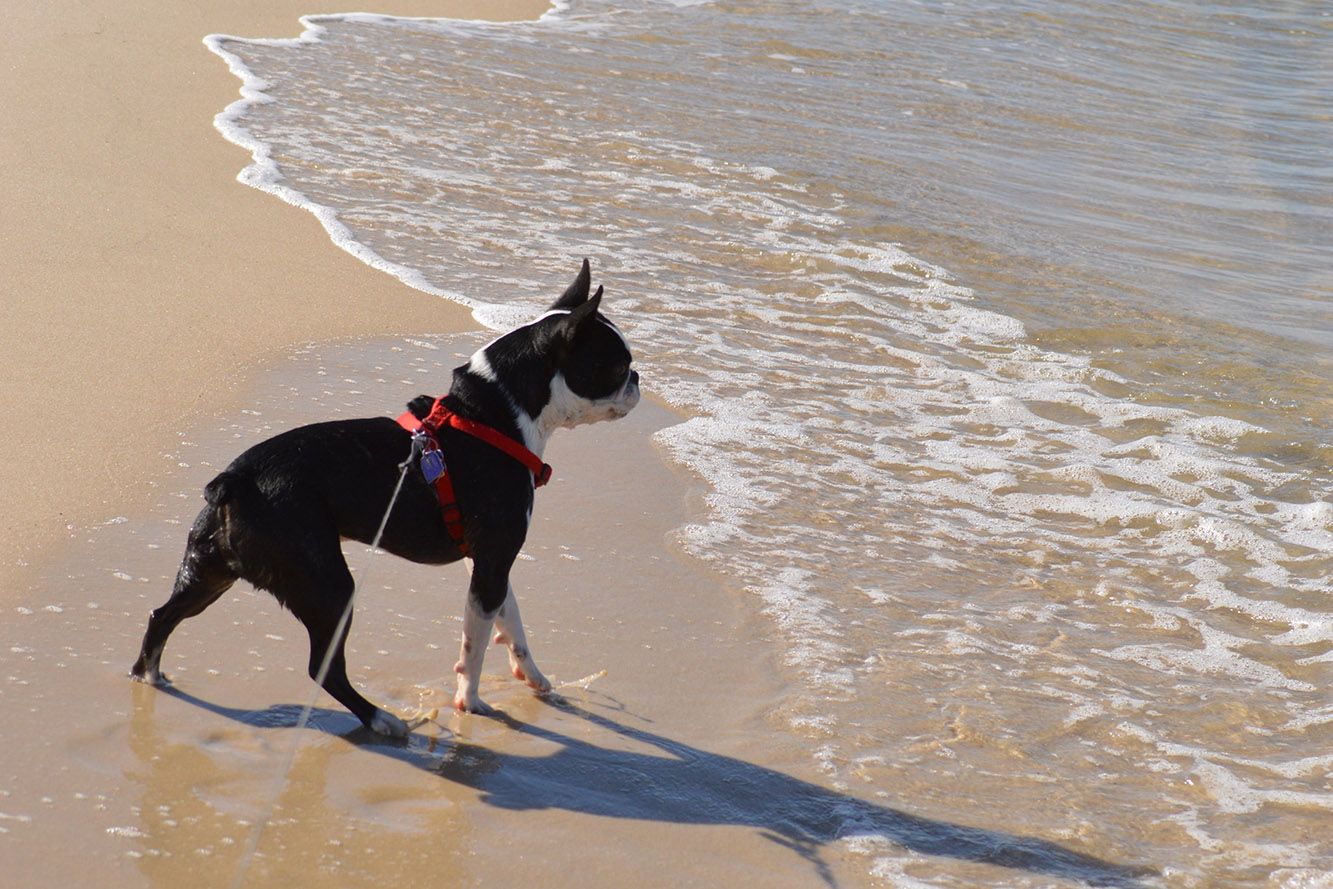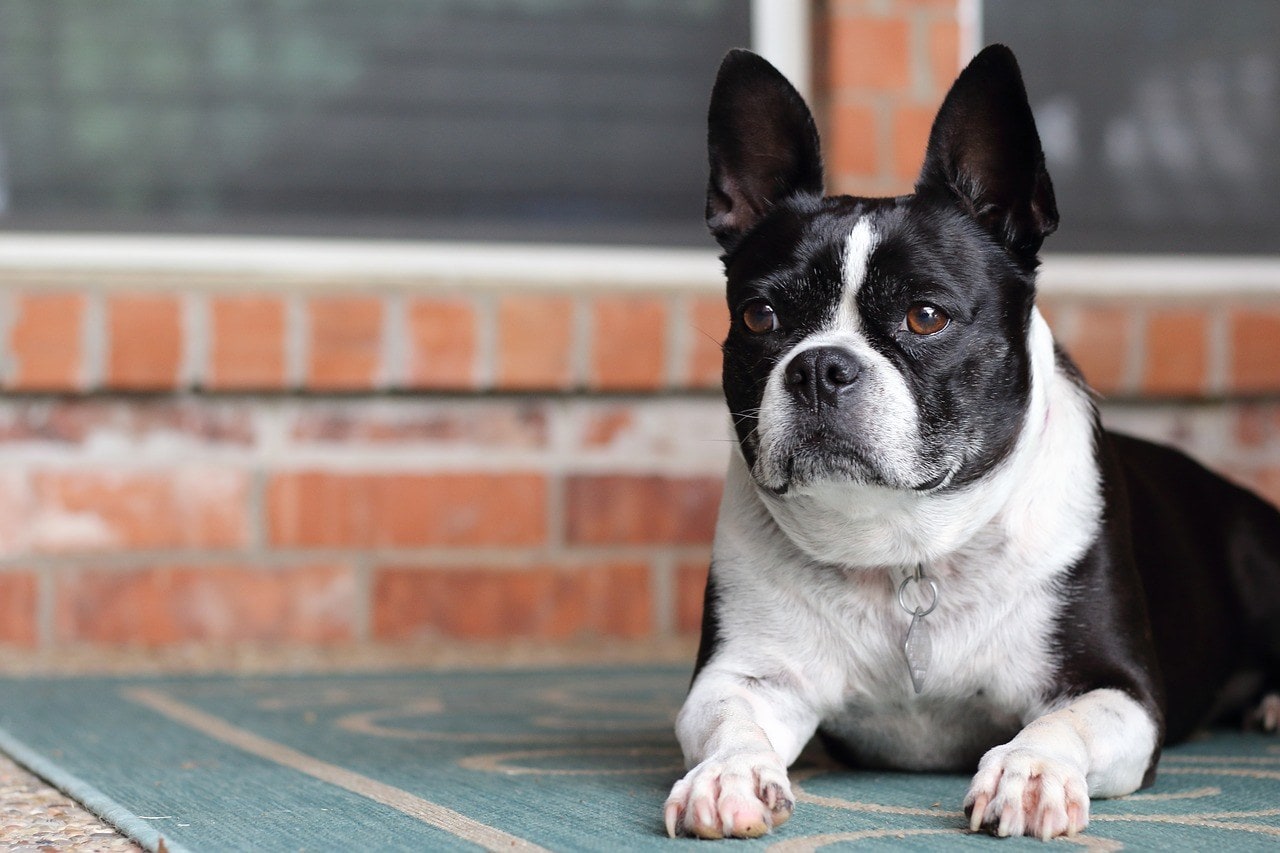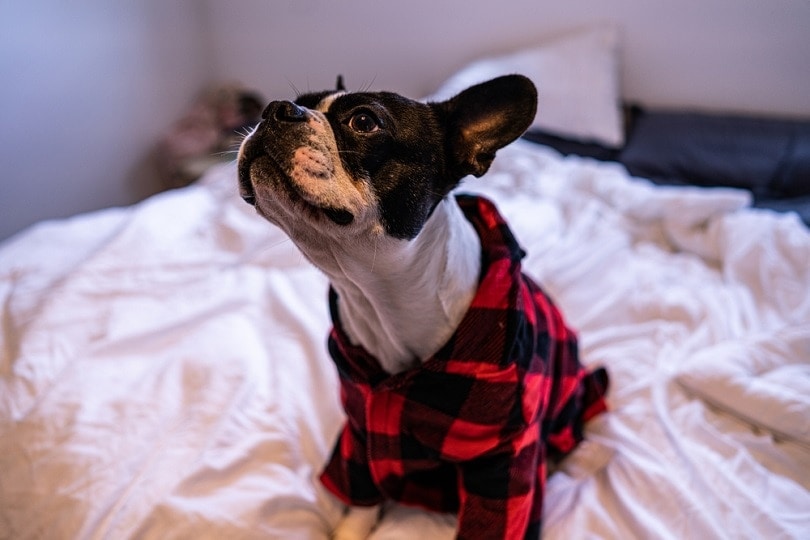
Last Updated: June 10, 2021
| Height: | 11-14 inches |
| Weight: | 15-25 pounds |
| Lifespan: | 12-15 years |
| Colors: | White, black, brown, brindle, cream |
| Suitable for: | Families, apartment-living, singles, seniors |
| Temperament: | Sociable, relaxed, curious |
The Frenchton is a hybrid dog, a cross between the Boston Terrier and the French Bulldog. These are sturdy but small dogs that often inherit most of the best qualities of both parents. They also go by many names, some of which include Frenchbo, Froston, Faux Frenchbo, and the one we’re using, the Frenchton
This breed is a designer dog created during the trend of crossing favorite household breeds for aesthetic. The Frenchton did help alleviate a few of the common health problems of the French Bulldog, though. These adorable pups tend to be total charmers because they make for such versatile and easygoing companions.
Frenchton Puppies — Before You Buy

| Energy |
|
| Shedding |
|
| Health |
|
| Lifespan |
|
| Sociability |
|
What’s the Price of Frenchton Puppies?
A Frenchton puppy’s price is primarily based on the pedigree and the parent’s overall cost. French Bulldogs tend to be the most expensive of the two parents.
A Frenchton puppy typically costs somewhere between $500 and $3,500. This cost ranges quite a bit, but it depends on the breeder and the puppy’s pedigree, even as a hybrid.
When you buy a new puppy from a breeder, it is essential for the continuation of quality breeding practices that you know how they breed and treat their dogs. You can do this by asking to see the facility in which they raise their dogs. Any breeder should be willing to show you any part of their facility that they allow their dogs. Examine it for safety features and quality of the space.
Beyond asking for a tour around the facility, you should also ask to see any certifications and registration papers that accompany the parents. These papers prove the lineage or pedigree of your puppy if there is one, as well as the parentage. Getting a look at their vet records can make you aware of any problems that your puppy could experience in the future. Take copies of these to your vet so they will be aware of potential health issues.
3 Little-Known Facts About the Frenchton
1. French Bulldogs are not, in fact, French.
French Bulldogs are not French, as the name would suggest. Instead, they received such a moniker because of their dramatic increase in popularity among the French.
The French Bulldog comes from the U.K. In Britain, breeders saw how popular the English Bulldog was. However, these big, burly dogs had somewhat of a reputation for being rather aggressive. To get around this, they decided to breed a smaller version of the dog to appeal to more of the public.
The idea was a hit success, and quickly, the smaller Bulldogs became more popular among the lace workers that predominantly resided in Nottingham. These lace workers began emigrating to France over the ensuing decades, looking for better opportunities than they were afforded in England. Of course, their adorable Frenchies went with them.
When the Frenchies arrived in France, they thrived. They were a charming little dog that resembled a toy-like Bulldog. The idea that people are attracted to anything miniaturized worked in these little dog’s favor, and they became vastly popular in France and were quickly discovered by Americans as well.
Dog owners from the United States first saw the French Bulldog appear at a dog show in Westminster in 1896. They quickly nicknamed them the Frenchie and adopted a few to take them to be bred back in America.
2. Although the Boston Terrier was bred in Boston, nobody knows why.
Everyone in the dog community agrees that the Boston Terrier was bred in Boston, but nobody is sure how, exactly when, or why. There is a story that a collective of coachmen for wealthy families began breeding Bulldogs with the currently extinct English White Terrier. Supposedly they wanted to create another fighting dog breed.
Another story is that a Bostonian man, called Robert C. Hooper, decided to import a dog that was already a cross between an English Terrier and a Bulldog. He might have also purchased this dog, whose name was Judge, from another Bostonian.
From this point forward, the story becomes clearer to historians. There was a Bulldog and English Terrier cross named Judge. From Judge came all the other Boston Terriers that we have today. Although they were not always called Boston Terriers, they have long been loved and well-bred throughout North America.
3. Frenchtons can suffer from separation anxiety because they are so social.
Frenchtons are a mix of two highly social animals. They do not do well if they are left on their own for long periods. They are entertainers that enjoy doing things that seem to make you laugh. Be careful of this so your happy reaction doesn’t cause them to repeat bad behaviors as they age.
If you know that you will have to leave your Frenchton alone frequently, it is best to get them a companion. They will even be happy with a cat if it means that they have a companion. However, another dog is an even better option because they are more likely to play with each other and have fun.

Temperament & Intelligence of the Frenchton
The Frenchton was bred to be a compassionate dog that acted as the ultimate family companion. They are small enough to be lapdogs yet spunky enough to enjoy getting out and being active for bursts of time. They are affectionate and loyal too, loving to cuddle just as much as anything else.
Although these dogs appear to be big softies, they can have quite a stubborn streak. Good luck getting them to do anything that they have decided that they don’t want to do. They are not shy and will be vocal about their displeasure if pushed. These dogs are intelligent and are often eager to please you overall.
Are These Dogs Good for Families? 
These dogs are a perfect dog to have for a family. They are sweet-natured and tend to be quite patient. Because they are a smaller breed, you must teach your children how to appropriately interact with the dog. They could hurt the Frenchton if they handle them too roughly, even if these pups look quite robust.
Does This Breed Get Along With Other Pets?
Typically, the Frenchton gets along well with other pets. They enjoy being social and getting to meet new humans and animals. They do not seem to have an aggressive bone in their bodies when they have been raised well.
Even though they can seem like they get along with everything, you must still practice care when you bring a new animal into the house. Introduce them to each other slowly, just in case your Frenchton feels like they have to assert some kind of dominance in their territory.
Things to Know When Owning a Frenchton
Food & Diet Requirements 
A Frenchton is a small dog that doesn’t have to exercise much to get their fill of activity during the day. They do not generally have large appetites. Feeding them about 1 cup of food a day spread between two meals is enough.
Both the French Bulldog and the Boston Terrier can have brachycephalic faces, meaning that their snouts are shorter than on a typical dog breed. To make it easier for them to eat, find a dog food that caters to small dogs. The kibble should be smaller and might even be in a different shape so it is easier for them to pick up and chew.

Exercise 
A Frenchton is a low-exercise dog. These little pups are always on the alert and happy and somewhat bouncy. But this quickly peters out, and they are then ready for a good cuddle and quality time.
Even if your Frenchton doesn’t seem that interested in getting exercise, it is still best for you to take them out on a daily walk. Try to give them 20 to 30 minutes of exercise each day minimum. Do not allow it to be too intense because the formation of their snouts can make it challenging for them to breathe.
You can take your dog to the dog park for socialization and activity. However, if you typically walk with your dog, then aim for around 5 miles each week.
Training 
Training a Frenchton can be a toss of a coin at times. While they mostly want to please you and keep you as happy as possible, they have a big stubborn streak. When they have set their mind on something, it is a challenge to get them to let it go.
During training sessions, never be rough with your pup. They are sensitive dogs and will not respond well to harsh treatment or voices. Try to figure out what motivates them to encourage them to participate.
Grooming 
Grooming a Frenchton is easy as they are low-maintenance. They have relatively thin coats that are quite short. To limit the amount that they shed around the home, brush them at least once a week with a rubber brush or a comb.

Beyond taking care of their coat, you need to look after other parts of their physical body. Clip their toenails about once a month because it is unlikely that your pup will run around enough to wear them down naturally. Keep their ears and eyes clean as well.
You should also brush their teeth at least once a week but preferably daily to protect them from dental issues later. Because their mouths are smushed into a smaller space than normal, it is quite common for these dogs to have dental problems.
Health and Conditions 
The Frenchton can be a relatively robust breed. Breeding these two lines together has helped eliminate some of the problems with inbreeding that the parent breeds experience. However, since both of these pups are similar in shape and size and share many of the same health problems, their crossbreeding hasn’t made the Frenchton that much healthier than the parents.
- Cataracts
- Elbow dysplasia
- Brachycephalic syndrome
- Respiratory issues
- Patellar luxation
- Atopic dermatitis
- Intervertebral disc disease
- Hip dysplasia
Male vs. Female
There are no recognizable differences between males and females in this breed.
Final Thoughts
The Frenchton is a wonderful companion dog, bred to be an excellent lapdog. Although there are quite a few potential health concerns, this pup is an overall low-maintenance breed to look after. If you need a dog to keep you company or be the newest member of your family, you have found a good option in the Frenchton.
Featured Image Credit: CGDavid, Shutterstock
The post Frenchton: A Complete Guide appeared first on Pet Keen.







